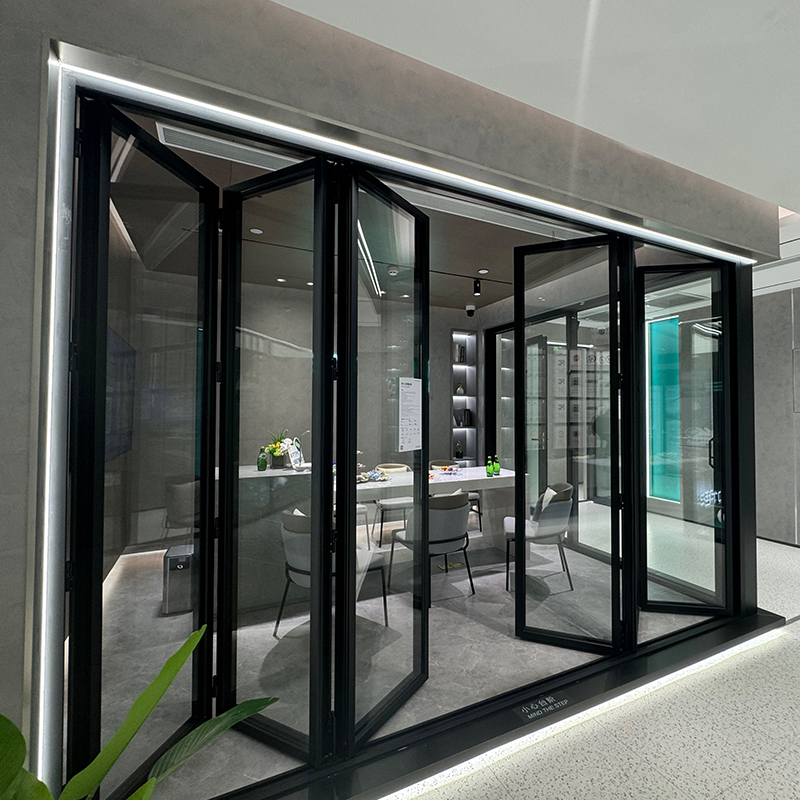Send inquiry
When it comes to connecting indoor and outdoor spaces, or designing flexible room dividers, door choice plays a significant role in both functionality and aesthetics. Among the top choices for modern homes and commercial buildings are aluminum folding doors, sliding doors, and French doors. Each door type has its unique strengths, ideal use cases, and limitations.
In this article, we’ll compare these three door types across a variety of categories including space utilization, design, insulation, cost, and user experience, to help you make the right decision for your space.
Aluminum folding doors consist of multiple panels that fold and stack to one or both sides of an opening. They are connected by hinges and operate on a top and bottom track, allowing a wide, unobstructed opening.
Sliding doors usually consist of two or more panels, with at least one sliding horizontally along a fixed track. Commonly used for patios and interior partitions.
French doors feature a pair of swinging doors (usually glass-paned) that open outward or inward from the center. Often used for traditional-style homes or smaller openings.

| Feature / Attribute | Aluminum Folding Doors | Sliding Doors | French Doors |
| Opening Mechanism | Panels fold and stack sideways | One panel slides over another | Doors swing open on hinges |
| Maximum Opening Width | Up to 90–95% of frame width | Typically only 50% usable | 80–90% depending on design |
| Space Usage | Requires space for folded panels | Requires wall space along track | Needs clearance for swinging |
| Aesthetic Appeal | Sleek and modern look | Minimalist and clean | Classic and traditional style |
| Thermal Insulation | Excellent with thermal break | Good (depends on frame/glass) | Varies (often weaker seals) |
| Security | Multi-point locking systems | Standard locks (less robust) | Traditional deadbolt or latch |
| Ease of Operation | Moderate (slightly heavy panels) | Very easy to operate | Easy but needs swing clearance |
| Installation Complexity | High (track alignment needed) | Medium | Low to Medium |
| Best Use Cases | Patios, garden doors, open-plan spaces | Balcony, terrace, internal partitions | Classic homes, small entryways |
One of the main reasons homeowners choose aluminum folding doors is their ability to open up nearly the entire width of a wall. This creates a seamless indoor-outdoor transition, perfect for entertaining, ventilation, or connecting to patios and gardens.
Folding doors offer the widest opening—up to 95% of the frame width.
Sliding doors are restricted by design—typically only 50% of the space is usable at one time.
French doors can open wide, but require space for the doors to swing open.
Conclusion: If maximizing open space is a priority, folding doors win.
Aluminum folding doors often come with thermal break technology, which significantly reduces heat transfer through the metal frame. Coupled with double or triple glazing, they offer excellent insulation for both hot and cold climates.
Folding Doors: Excellent sealing, modern weatherproofing features.
Sliding Doors: Generally good, but cheaper models may leak air.
French Doors: Can be less effective unless well sealed and insulated.
Verdict: Folding doors offer the best overall performance in insulation when high-quality systems are used.
Aluminum folding doors are typically equipped with multi-point locking systems across several panels, enhancing security.
Folding Doors: Secure with top/bottom locks and internal gear systems.
Sliding Doors: Varies by model; standard latch locks can be less secure.
French Doors: Security depends on hardware; may need reinforcement.
Verdict: Folding doors are typically the most secure option when installed correctly.
Aluminum folding doors offer a modern, minimalistic appearance, with slim sightlines and large glass panels.
Sliding doors give a clean and understated look, fitting for contemporary designs.
French doors exude a classic, elegant charm, ideal for traditional architecture.
Depending on your home style, each has its design merits. Folding doors tend to suit modern, luxury homes, while French doors add romantic or vintage aesthetics.
Folding doors require precise installation of top and bottom tracks. Regular maintenance of hinges and rollers is needed.
Sliding doors are easier to install and maintain but may require track cleaning.
French doors are simpler to install but hinges may sag over time.
Maintenance Tip: All door types benefit from regular lubrication of moving parts and cleaning of glass and seals.
| Application Area | Best Door Type | Reason |
| Garden or Patio Access | Folding Doors | Large opening, full indoor-outdoor flow |
| Small Balcony | Sliding Doors | Saves space, easy to operate |
| Heritage Home Entry | French Doors | Aesthetic match with traditional architecture |
| Open-Plan Interior | Folding or Sliding | Creates flexible partitions or wide openings |